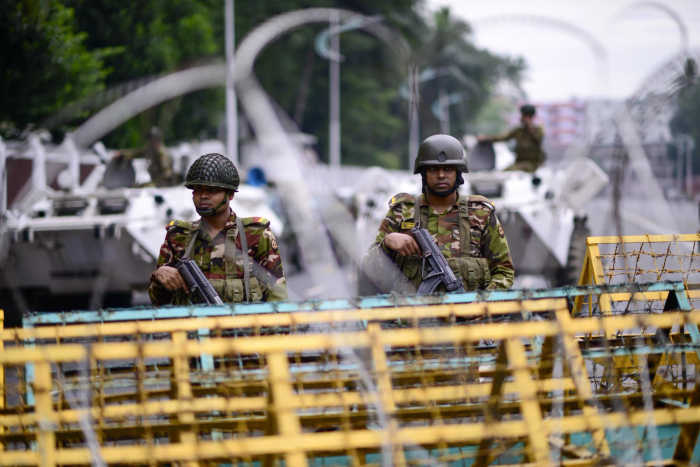Published 17:55 IST, November 20th 2024
A New Axis? Bangladesh’s Growing Alignment with Pakistan Sparks Security Concerns for India
The Panama-flagged ship, Yuan Xiang Fa Zhan, transported goods from Karachi, signalling a thaw in bilateral relations and raising strategic concerns for India.
- Defence
- 4 min read
Dhaka, Bangladesh - In a watershed moment since Bangladesh’s independence in 1971, a direct cargo vessel from Pakistan docked at Chittagong port, signalling a thaw in relations between the two nations after five decades of estrangement. The Panama-flagged ship, Yuan Xiang Fa Zhan, arrived on November 11 from Karachi, marking the establishment of a direct maritime route between the former adversaries. This development underscores a major strategic realignment in South Asia, with significant geopolitical implications for India.
The container ship, carrying goods from Pakistan and the UAE, delivered raw materials critical to Bangladesh’s garment industry and essential food supplies. Pakistan’s High Commissioner to Bangladesh, Syed Ahmed Maroof, hailed the event on social media as a breakthrough for bilateral trade, emphasizing streamlined supply chains and reduced transit times.
Previously, the absence of a direct maritime link forced Pakistani goods to transit through intermediate ports in Sri Lanka, Singapore, or Malaysia. Bangladesh further facilitated this trade shift by relaxing stringent import restrictions on Pakistani goods in September, a move that had previously caused significant delays.
Signals of Realignment
The maritime link is the latest in a series of developments suggesting a recalibration of Bangladesh’s foreign policy under the three-month-old Muhammad Yunus-led caretaker government, moving away from India and fostering closer ties with Pakistan.

- Erosion of Historical Ties with India: Following the overthrow of Sheikh Hasina’s government in August, Bangladesh has witnessed a surge in anti-India rhetoric. False narratives, such as claims that India caused flooding in Bangladesh by releasing water from the Dumbur Dam, have gained traction, prompting official clarifications from New Delhi.
- Pakistan-Centric Commemorations: In September, Dhaka’s National Press Club held an event commemorating Muhammad Ali Jinnah, Pakistan’s founder, a sharp departure from the Hasina government’s pro-India stance.
- Defense Collaborations with Pakistan: Bangladesh has enhanced military ties with Islamabad, placing significant ammunition and explosives orders from Pakistan’s Ordnance Factories.
- Diplomatic Engagements: Muhammad Yunus and Pakistan’s then-Prime Minister Shehbaz Sharif held a high-profile meeting at the United Nations in September, advocating for renewed cooperation.
The caretaker government has also taken controversial steps domestically, including cancelling national holidays commemorating Bangladesh’s independence and suggesting a resolution of the 1971 war legacy without demanding an apology from Pakistan.

At the same time, the Yunus administration downplayed reports of attacks on Hindu minorities, labelling them as exaggerated, and raising concerns about communal tensions under its regime.
China’s Expanding Role and Radical Islamist Influence
China’s growing economic footprint in Bangladesh adds another layer to the shifting dynamics. Beijing has invested heavily in the country’s energy sector through its Belt and Road Initiative (BRI), financing nearly 90% of new projects. This bolsters Dhaka’s economic growth but ties it closer to Beijing, further complicating India’s strategic interests.
-1732105435995.webp)
Radical Islamist groups such as Harkat-ul-Jihad-al-Islami (HuJI) and Jamaat-e-Islami’s student wing, Islami Chhatra Shibir (ICS), have also gained prominence, often under the guise of advocating for democracy. Indian intelligence suggests substantial financial support from Pakistan’s ISI and potentially Chinese entities to these groups, which incites anti-India sentiment and destabilizes regional harmony.
India’s Concerns and Strategic Challenges
India views these developments with growing alarm, as they signify a potential geopolitical alignment between its eastern and western neighbours, historically adversarial to New Delhi. The strategic implications include:
- Security Risks: Increased cooperation between Pakistan and Bangladesh could heighten cross-border security challenges, particularly in India’s Northeast.
- Economic Isolation: China’s deepening influence and the Bangladesh-Pakistan maritime link threaten to erode India’s economic and strategic clout in South Asia.
- Regional Instability: The rise of radical Islamist groups and attacks on minorities in Bangladesh could destabilize the region, with ripple effects on India’s domestic security.
The direct maritime link between Pakistan and Bangladesh represents more than just logistical convenience—it is a harbinger of shifting alliances in South Asia. For India, the stakes are high as it navigates a changing regional landscape marked by Bangladesh’s pivot toward Pakistan and China. New Delhi must recalibrate its diplomatic and strategic engagement to counter this emerging alignment and safeguard its interests in a rapidly evolving geopolitical environment.
Updated 17:55 IST, November 20th 2024